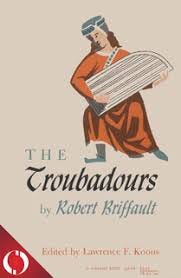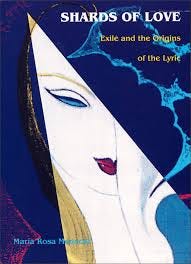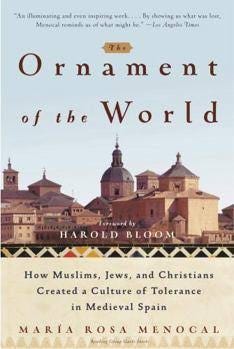Taking Notes—digesting texts through note-taking—has often involved, for me, the act of stealing lyrical inspiration from them as well: taking musical notes, the chords and keys scribbled in my margins next to a choice turn of phrase. Translating someone else’s words into personal lyrics, or song.
Some call this Love and Theft, others, Stealing Like an Artist.
I call it Taking Notes.
That’s true of this week’s Note, about an anonymous Hispano-Arabic love song to a fishy woman. It comes from the pages of Robert Briffault’s Les Troubadours (1945). I offer an English translation of what remains of this song below.
Briffault stands out, alongside historians like Will Durant, as a singularly unbiased scholar for his time (1876-1948). You might call him “progressive,” if that word still has any meaning. His third book, The Mothers (1931), argued that human sentiments and institutions derived from matriarchal societies.
In The Troubadours (as Les Troubadours, written while the author was trapped in occupied Paris, was finally published in English in 1965), Briffault makes many of the arguments that Maria Rosa Menocal would make fifty years later, in Shards of Love: Exile and the Origins of the Lyric (1994). Namely, that the Western love song—the lyric—entered Europe from Africa and Arabia, via Spain.
In fact, Briffault beat not just latter day scholars, but “the great discovery . . . by Samuel Stern,” mentioned by Menocal and many others: the discovery, in 1948, that a revolutionary new form of song from tenth and eleventh-century Spain, long dismissed by scholars as “gibberish,” actually had, as Briffault called it, a “Moorish Origin.”
This lyric form, zajal (“song”), went on to inspire the troubadours of Provence, and inflect the vernacular revolution of Dante (writing in Tuscan Italian, instead of Latin). It was sung in a mixture of languages, including Arabic and Mozarabic (“wanna-be Arabic,” a Spanish vernacular). Most of the lyrics that Sterne investigated in 1948 were preserved in Hebrew—and in the “gibberish” conclusions of their verses, called the kharja: little couplets or punctuating phrases, which turned out to be preserved in the vernacular of Spanish Christians, Mozarabic.
Moreover, the kharja refrain of these songs was often sung in the female voice, possibly by Christian women flirting with their Arabic counterparts in the main verse—sort of like modern duets between lovers like Johnny Cash and June Carter, or the Raylets mouthing-back to Ray Charles in “Hit the Road Jack,” in gendered dialogue.
As Menocal describes Samuel Sterne’s great innovation of 1948: “what he did was . . . read some poems from eleventh-century Spain as if eleventh-century Spain had been a multicultural, multilingual society.”
Which indeed it was, a Culture of Tolerance and “living together” cultivated by Muslims, Jews, and Christians, as Menocal described it in 2002—convivencia.
Briffault noted something similar three years before Sterne’s 1948 breakthrough, when he published his chapter on the “Moorish Origin” of Les Troubadours in 1945. And, in a dark irony, he described the convivencia among Muslims, Jews, and Christians in this corner of the world as Nazis occupied the land of the troubadours, and Franco ruled Spain.
Briffault had already offered part of this radical idea much earlier in The Making of Humanity (1919)—written mostly in the trenches during WWI—“the contribution of Arab civilization to that of Europe,” that foreshadows the Moorish Origin of Les Troubadours.
Surprisingly, Briffault goes unmentioned among Menocal’s many sources; I don’t believe I’ve seen him cited by another favorite source on this subject, Mr.
.I stumbled across Briffault’s Troubadours entirely by accident, on the shelves of Powell’s Books one rainy afternoon, in Portland—long before I discovered Menocal, though I read her first, while Briffault waited patiently on the shelf. His biography alone—itinerant as any minstrel, wandering from France to Florence and New Zealand, England and New York; beset by the deaths of lost loves; dying nearly destitute by choice; a surgeon who became a social historian in his free time, scribbling from the trenches and occupied Paris—is worth the read.
Briffault lived-out the Exile in Menocal’s Exile and the Origins of the Lyric.
In his opening chapter about the “Moorish Origin” of everything from chivalric romance to the harpsichords of Bach and Mozart, and so-called Western literature itself, Briffault quotes an excerpt of: “a zajal of Moorish Spain translated into Spanish by M.J. Valera, who also retains the meter and distribution of rhyme of the original.”
That’s important, considering the zajal introduced the concept of rhyme and rhythm to European poetry, and song.
Briffault’s lyric, translated into Spanish by M.J. Valera, bears no name. I probably wouldn’t have bothered to translate it into English, if it wasn’t for a strange coincidence: I was composing my own lyrics at the time, for piano, about a woman who dances like a fish in the ocean. Those lyrics (not included here), also included a reversal similar to the one below—the fisherman, or lover, hooked by his fish.
My fish in real life also happens to speak Spanish—which was helpful in the initial stages of transliteration.
Because Briffault quotes a modern Spanish translation of a medieval vernacular song-form that was popular “amongst all classes of the mixed population of Andalusia, Arabian, Mozarabian and Romance,” originally sung in two-or-three different languages, one of them dead, my source is once-removed from the Moorish original, the zajal.
I went a step further, and made what may be the first English translation of this shard of lyric, attempting to retain the meaning, meter, and rhyme of Valera’s Spanish.
Only when I set both translations to the rhythm of Spanish guitar, however, did I realize how far-removed my English meter was from the Spanish, in the first draft.
I used a flamenco rhythm, which didn’t exist in tenth-century Spain, to guide the translation. Since we don’t have the music that accompanied these ‘poems,’ I picked a somewhat-arbitrary genre to tease out the rhythm of the words; the eighteenth-century rhythms of Romani exiles from India—pejoratively known as “gypsies”—seemed appropriate enough. Only then did it begin to correspond to the Spanish ‘original,’ which had already lost something in its translation from a mixture of medieval vernaculars to Castillian Spanish.
It took music, in other words, to bring these lyrics halfway back to life, and imagine how they might have been delivered in the tenth century. It’s not the long-lost original, but this is as close as you can get, in English, here: shards of love, from The Third Ear.
En balde es tanto afanar, In vain it is so much to wish,
amigos, para pescar. my friends, to catch a fish.
En las redes bien quisiera In well-made nets would I like
prender la trucha ligera; to catch the trout so light;
mas esta niña hechicera more, for this sorceress of night
es quien nos debe pescar. it’s her for whom we should fish.
Los peces tienen recelos The trout has soulful regrets
y burlan redes y anzuelos; to tease the hook, eye the nets;
pero en sus dulces ojuelos but in her sweet eyes we should let
van nuestras almas a dar. our souls be gathered like fish.
A few lines from a thousand years ago, that didn’t get away.









